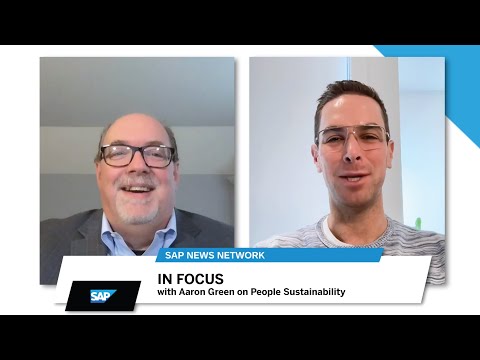Human experience in the workplace has never been more important than it is right now. As the new chief marketing and solutions officer (CMSO) of SAP SuccessFactors, Aaron Green believes that it is a critical moment for organizations to shift to a new kind of business, where people and culture leaders have a permanent seat at the table and every decision is a “people” decision.
SAP SuccessFactors’ vision for the future of work brings together cloud technology, data, and analytics to put people at the center of business. “It’s something we put into our product: the capability for organizations to change work for good,” Green says.

In the post-pandemic workplace, SAP has identified people sustainability as a business imperative that is the foundation for all other organizational sustainability goals. Green steps into his new role at SAP SuccessFactors at a time when traditional HR tenets are coming under scrutiny and employees are voicing their requirements for flexibility, equitable pay, and purpose.
As organizations cope with market dynamics and a changing workforce, Green sees the opportunity for SAP SuccessFactors’ comprehensive global HR platform to drive value for customers by strengthening the connection between HR and business operations, creating both a sustainable workforce and profitable organization.
Closing the Skills Gap to Meet Business Challenges
The skills gap crisis continues to intensify in the post-pandemic world, driven by the unrelenting pace of innovation and the new technologies in the workplace. For stable business operations amid the global turmoil, it is essential that organizations have a sustainable, healthy, and skilled workforce that can readily adapt to change. Helping organizations build new skills and uncover hidden skills in their existing workforce are among the strengths of SAP SuccessFactors.
“Organizations are talking about how they skill and reskill people to build that resiliency and redundancy into the workforce, so that they are able to meet the challenges of the future,” Green says. “That’s really where SAP SuccessFactors plays a huge role in helping organizations understand what skills they have, what skills they need, and how to close that skill and experience gap.”
Building High-Performing Teams with the Whole Self Model
The right skills alone will not create a sustainable, empowered workforce, as the lessons of post-pandemic work has shown. Employees are demanding to be valued as individuals with consideration for their holistic lived experiences, passions, and characteristics that make up who they are. Without this deep, powerful connection of the employee’s authentic self to the workplace culture, some may say, it’s just a job.
The whole self model is guiding how SAP advances the SAP SuccessFactors HXM Suite. By creating a way for organizations to identify people’s individual traits, like team strengths and work styles, as well as their passions and motivations, they can improve DE&I, create better work experiences and build high-performing teams. Green says that the benefit to business is “being able to not just capture that data but being able to, at an organizational level, use that data to understand how to construct the best-running teams.”
“What are the psychological, the purposeful attributes, of people that make up a high-performing team? To be able to identify those people inside your current workforce and bring that forward – that’s the [power of the] whole self model,” he says.
Understanding How Cultural Diversity Impacts Global Business
Green’s most recent role at SAP was senior vice president and head of SAP SuccessFactors, Asia Pacific and Japan. He has spent the last 10 years working and living across the Asia Pacific region, with six of those years at SAP SuccessFactors. At the mention of Asia Pacific and Japan, Green beams a smile. “I would say it’s probably one of the proudest moments of my career,” he says, referring to his time spent at SAP SuccessFactors in the region. One of the things he found unique about Asia is its cultural diversity. He learned “with that cultural diversity comes different challenges in how you really run an organization and get the best out of your people and also make them feel included.”
Building a diverse and inclusive team was one of Green’s greatest achievements. “I’m really proud that as a leadership team in Asia Pacific and Japan over 46% of the workforce are female,” he says, noting that the global average for female talent in tech organizations is 26%. “That’s not just a reflection of the inclusivity of Asia Pacific, but it’s also the way we as a leadership team make sure our workforce reflects the communities that we operate in and serve.”
Green intends to carry this valuable intercultural experience into how he manages and prioritizes to best serve the 9,000+ global customers of SAP SuccessFactors. As he says, “In order to serve those organizations, we have to have localization, that deep understanding of how to operate and how business needs to operate in that global but also very local context.”
Watch SuccessConnect 2022 keynotes and select sessions here.



